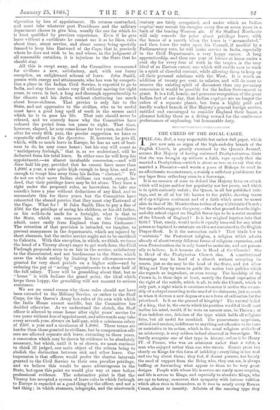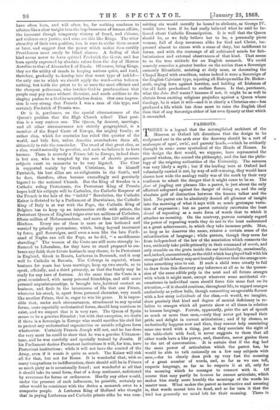THE CREED OF THE ROYAL CASTE.
THE John Ball, a very respectable bat rather dull paper, which just now acts as organ of the high-and-dry branch of the English Church, is greatly exercised by the Queen's Journal,. accuses Her Majesty of having embraced Presbyterianism, hints that she was brought up without a faith, says openly that she married a Presbyterian—which is about as true as to say that she married a Dissenter—and wants a posse of Bishops to send in, an affectionate remonstrance, c:.rtaitily a sufficient punishment for any lapse from orthodoxy even in a Sovereign.
It is no concern of ours to defend ller Majesty from an attack which will injure neither her popularity nor her peace, and which is in spirit curiously unfair ; the Queen, in all 'her published writ- ings, and in all of her life known to the public, showing traces of deep religious sentiment and of a faith which must be nearer akin to that of Mr. Maurice than to that of any Calvinistic Church ; but the article suggests the query,—On what ground does the high- and-dry school expect an English Sovereign to be a strict member of the Church of England ? Is it her original baptism into that faith? That, surely, would make it equally immoral for any other person so baptized to entertain an idea not contained in the English Prayer-Book. Is it the coronation oath ? That binds her to " maintain" the Protestant religion, a religion which admits already of about twenty different forms of religious expression, and even Protestantism she is only bound to maintain, and not person- ally to believe. Is it because she is Head of the Church? She
is Head of the Presbyterian Church also. A constitutional Sovereign may be head of a church without accepting its tenets, just as she may be the head of the State, and yet allow Whig and Tory by turns to guide the nation into policies which she regards as imprudent, or even wrong. The headship of the Crown is, in these days at least, merely the formal expression of the right of the nation, which is all, to rule the Church, which is only part, a right which it exercises whenever it settles the owner- ship of a chapel according to the creed of its claimants, just as much as when it decrees a new dogma or a new form of ordination for the priesthood. Is it on the ground of kingship ? The natural belief of a king, that is, the one to which his position would of itself most incline his mind, would, if he were an earnest man, be Theism ; or if an indolent ore, Atheism of the type which holds all religions false, but all useful for mankind. The pococurante scepticism, critical and careless, indifferent to anything not offensive to its taste or restrictive to its action, which is the usual religious attitude of an aristocracy, is very seldom indeed observed in Sovereigns. We hardly recognize one of that type in history, unless it be Henry IV. of France, who was an aristocrat rather than a ruler, a man who enjoyed rather than one who strove. Events press too closely on Kings for this form of infidelity ; everything is too real and too big about them ; they feel, if decent persons, too keenly the need of support from the Being who, they can see, is always baffling or forwarding what appear to them to be very great designs. People with whom life is severe are rarely mere sceptics, and life is severe to Kings, and especially to absolute Kings, who are apt to betray, moreover, that sympathy with intense volition which often rises in themselves, as it rose in nearly every Roman Caesar, almost to insanity. Atheists of the sneering type they have often been, and will often be, for nothing conduces to atheism like a clear insight into the hopelessnesses of human affairs, the incessant though temporary victory of fraud, and chicane, and violence over justice, and none see this like Kings. The utter absurdity of their own position, too, is sure to strike them sooner or later, and suggest that the power which makes them earthly Providences must surely be blind chance. A feeling of that kind seems never to have quitted Frederick the Great, and has been openly expressed by absolute rulers from the day of Marcus Aurelius to that of Alexander I. of Russia. Of course, being Kings, they see the utility of creeds in keeping nations quiet, and tend, therefore, gradually to develop into that worst type of infidel— the only one to which we should apply the word—who believes nothing, but holds the priest to be at once the most efficient and the cheapest policeman, who invokes God in proclamations that people may pay taxes without distraint, and sends soldiers to die singing psalms to a God he nevertheless denies. Our own itupres- sion is very strong that Francis I. was a man of this type, and certainly Frederick of Prussia was.
Or is it, perchance, on the special circumstances of the Queen's position that the High Church relies? That posi- tion is a very curious one. The Queen, by descent, marriage, and all other circumstances not strictly geographical, is a member of the Royal Caste of Europe, the mighty family, or rather clan, which for centuries has ruled this quarter of the world, and bids fair, unless America overshadows them all, ultimately to rule the remainder. The creed of that great clan, as a clan, would naturally be peculiar, and such we believe it to have become. There is scarcely a Prince left iu Europe, indeed there is but one, who is tempted by the sort of electric pressure subjects exert on monarchs to be very bigoted. The Czar is supported mainly by Greek Christians, he is himself Patriarch, his best allies are co-religionists in the South, and he does, therefore, often become exceedingly and genuinely bigoted to the national Church. But the King of Sweden is a Catholic ruling Protestants, the Protestant King of Prussia hopes half his subjects will be Catholics, the Catholic Emperor of the French is the heir of the " infidel " Revolution, the Catholic Kaiser is dictated to by a Parliament of Darwinians, the Catholic King of Italy is at war with the Pope, the Catholic King of Belgium has to keep up an internecine strife with priests, the Protestant Queen of England reigns over ten millions of Catholics, fifteen million of Mohammendans, and more than 150 millions of Hindoos. Every one of them is more or less bothered and worried by priestly pretensions, which, being beyond treatment by force, gall Sovereigns, until even a man like the late Ferdi- nand of Naples can call the Pope, as he did, " a meddlesome shaveling." The women of the Caste are still more strongly in- fluenced to Liberalism, for they have to stand prepared to em- brace any faith their future husbands may choose, to be Protestant in England, Greek in Russia, Lutheran in Denmark, and it may well be Catholic in Bavaria. The Coburgs in especial, whose business for years has been marriage, keep up two creeds, so to speak, officially, and a third privately, so that the family may be ready for any turn of fortune. At the same time the Caste is a great cousinhood, with many personal friendships, and still more personal acquaintanceships, is brought into habitual contact on business, and finds in the intercourse of life that one Prince, whatever his creed, is, apart from personal character, very much like another Prince, that is, eager to win his game. It is impos- sible that, under such circumstances, attachment to any special forms, more especially ecclesiastical forms, should long continue to exist, and we suspect that it is very rare. The Queen of Spain seems to be a genuine Ritualist ; but with that exception, we doubt if there is a Sovereign in Europe who would sacrifice his civil list to protect any ecclesiastical organization or outside religious form whatsoever. Certainly Francis Joseph will not, and he has done the very most he could to show that he was a genuine Ultramon- tane, and he was carefully and specially trained by Jesuits. If his Parliament desires Protestant institutions it will, for him, have Protestant institutions ; while it will not have the control of the Army, even if it wants it quite as much. The Kaiser will risk all for that, but not for Rome. It is wonderful that, with so many temptations to indifferentism, there should still be in Princes so much piety as is occasionally found ; not wonderful at all that it should take its usual form, that of a deep sentiment, unfettered by reverence for forms or ordinances. Hardly any other would, under the pressure of such influences, be possible, certainly no other would be consistent with the duties a monarch owes to a composite people. A Lutheran King of Holland who thought that in paying Lutherans and Catholic priests alike he was cons- !flitting sin would morally be bound to abdicate, as George IV. would have been if he had really believed what he said he be- lieved about Catholic Emancipation. It is well that the Queen should be, as we fully believe her to be, a personally pious woman, full of deep reverence alike for God and Christ, im- pressed almost to excess with a sense of duty, but indifferent to forms, and with the contempt of all cultivated minds for Sab- batarianistn and external observances of that kind. That seems to us the true attitude for an English monarch. We could scarcely conceive a greater burden on the nation than a Sovereign earnestly Ritualistic, assisting at daily mass, or decorating the Chapel Royal with crucifixes, unless indeed it were a Sovereign of the English Calvinist type, rejecting all Bishops unlike Dr. Bicker- steth, urging laws against heretics, and holdiug all Irishmen of the old faith predestined to endless flames. Is that, perchance, what the John Bull wants ? because if not, it might be as well to abstain from exciting religious prejudice against a Queen whose theology, be it what it will—and it is clearly a Christian one—has produced a life which has done more to raise the English ideal than that of any Sovereign either of her own dynasty or that which it succeeded.































 Previous page
Previous page